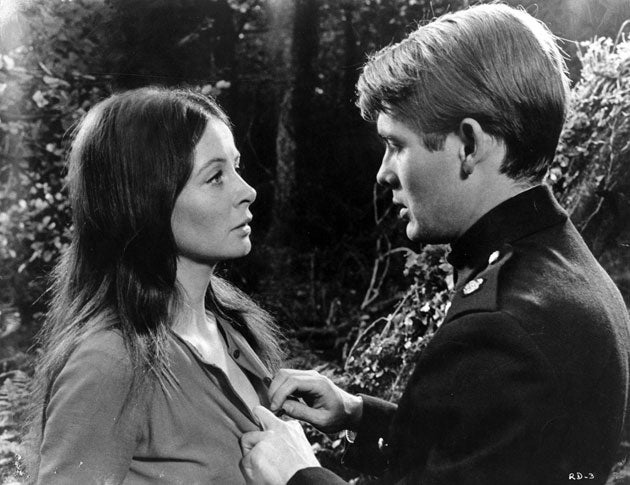Return of Ryan's daughter
Sarah Miles, star of David Lean's 1970 classic drama set in Ireland, is planning a sequel

The critics loathed it, and the public just ignored it. When Ryan's Daughter was released in 1970, it proved such a box-office dud that many blame it for stalling the director David Lean's career for 10 years. Now it is considered one of the British director's best and most popular films. It is an unrepeatable classic – only now they want to do it again.
Sarah Miles, who was nominated for an Oscar for her role as Rosy Ryan, is writing a script and undertaking research in Ireland for a sequel. Yesterday her agent said: "She is writing a script and there is a producer for a film, but it's very early days."
Lean's sumptuous shots of County Kerry's Dingle Peninsula – in particular his love scene where a breathless Miles commits adultery among the swaying trees and burbling brooks of a dense forest – were considered overpowering by the critics.
The public was turned off by the subject matter. The story of a married Irish woman from a nationalist village who has an adulterous affair with a British army officer in 1916 did not fit well with the outbreak of violence in Northern Ireland.
Yet it had all the ingredients for a classic. Not only was it directed by Lean, fresh from such instant greats as The Bridge on the River Kwai, Lawrence of Arabia and Doctor Zhivago, it starred John Mills, who turned in an Oscar-winning performance as the village idiot, and the Hollywood legend Robert Mitchum.
It was written by Robert Bolt, who had also scripted Doctor Zhivago and A Man for All Seasons and who was married to Miles.
Based on Gustave Flaubert's Madame Bovary, the film starred Miles as the eponymous daughter, married to schoolmaster Mitchum but bored and disenchanted. Her affair with the new British officer (played by Christopher Jones) from the local army base brings tragedy and public humiliation for herself and her husband.
The intervening 40 years have been kind to the film, however. Critics have come to regard it as among Lean's finest work, and audiences, particularly women, have warmed to its romanticism and lush cinematography.
Steven Organ, a film producer who runs the Davidlean.com website and edited David Lean: Interviews, which was published last month, said the film's romance gives it a predominantly female appeal, compared with the male appeal of his previous two films.

Watch Apple TV+ free for 7 day
New subscribers only. £9.99/mo. after free trial. Plan auto-renews until cancelled.
ADVERTISEMENT. If you sign up to this service we will earn commission. This revenue helps to fund journalism across The Independent.

Watch Apple TV+ free for 7 day
New subscribers only. £9.99/mo. after free trial. Plan auto-renews until cancelled.
ADVERTISEMENT. If you sign up to this service we will earn commission. This revenue helps to fund journalism across The Independent.
"It is interesting that Miles wants to develop the character of Rosy," he said. "The film doesn't end on a particularly positive note. It's perhaps a chance to redress that, although Lean is a difficult act to follow.
"It took a long time to warm up," he added. "I get a lot of people on the website saying it is their favourite Lean film. A lot of women are attracted to the film – I know a group who go to Dingle every year. I think it came out at the wrong time. If it came out now it would be extremely popular. It is a great film. There are moments that are startling because of what he was able to accomplish with a camera and location shooting. The sequence in which Robert Mitchum follows his wife's footsteps in the sand is among the best work Lean had ever done."
Slow burners: Box office flops that cleaned up
Once Upon a Time in the West (1968)
Sergio Leone's ode to the fading American frontier opened to empty cinemas on its first release. It now has a cult status among directors such as Martin Scorsese.
Blade Runner (1982)
Overshadowed by ET at the American box office. Now a darling of Great Movie lists it has been voted best science fiction film in Empire and the New Scientist. In Britain, however, it won three Baftas.
Shawshank Redemption (1994)
Trailed in only ninth for ticket sales on its opening weekend. Nominated for seven Academy Awards, it lost out to the year's big winner Forrest Gump and did not win a single one. But word of mouth helped it top 1995's video rental chart and it is currently No 1 on the Internet Movie Database (IMDb's) 250 greatest films.
Citizen Kane (1941)
Now regarded as a landmark achievement in film, it failed to make a profit on its cinema release and hurt the reputation of Orson Welles, its 25-year-old boy wonder writer-director-actor. It is ranked the best film of all time by the American Film Institute and the British Film Institute.
Duck Soup (1933)
A box office disappointment compared with the Marx Brothers' previous films. The film's final scene is ranked by American critic Harold Bloom alongside writings by Faulkner and Pynchon as among the greatest works of American art produced in the 20th century.
Mark Jewsbury
Join our commenting forum
Join thought-provoking conversations, follow other Independent readers and see their replies
Comments
Bookmark popover
Removed from bookmarks